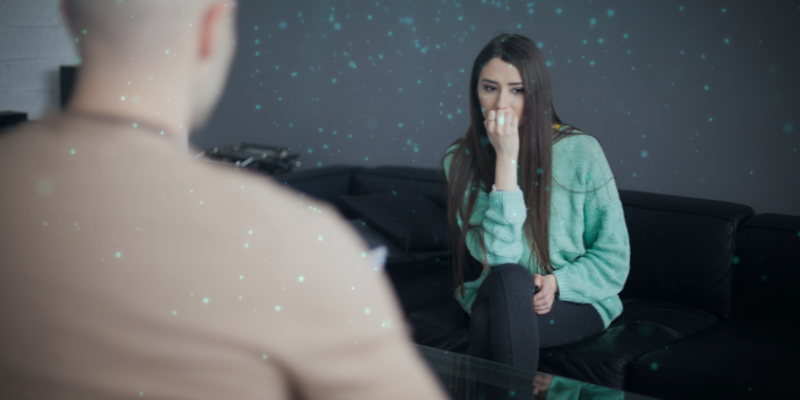
Anxiety—it can make you feel like a mental mess with swirls of nervousness, fear, and worry filling your mind. But that’s not the only negative impact of anxiety disorders, the most common mental health issue in America. Beyond the more predictable mental and emotional challenges that come with anxiety, there are a host of unexpected physical symptoms that can take a toll on your overall health. Having anxiety can profoundly affect your body—literally, from head to toe. Here are some unexpected yet common physical symptoms of anxiety you need to know.
Beyond the more predictable mental and emotional challenges that come with anxiety, unexpected physical symptoms are far-reaching and can take a toll on your overall health. Click To Tweet
10 SURPRISING PHYSICAL SYMPTOMS OF ANXIETY
1. Inflammation
A 2017 study suggests there is a strong connection between inflammation and anxiety disorder. Inflammation can increase the risk for a host of issues, including heart disease, autoimmune diseases, diabetes, arthritis, and cancer. Mild to moderate symptoms from chronic inflammation are weight gain, overall body pain, and recurring infections. Inflammation might not be something you can pinpoint as a symptom, but it can leave you with an overall feeling that something is not right physically.
2. High blood pressure
Research published in Neuropsychiatric Disease and Treatment suggests an association between hypertension and anxiety. High blood pressure can be dangerous if left untreated and has its own symptoms such as headaches and blurry or double vision. It is important to check your blood pressure regularly as it changes several times throughout the day.
3. Shortness of breath
The feeling of being unable to catch your breath is common in people with anxiety and can increase nervousness as it is a frightening sensation to feel like you can’t breathe. It is a cycle that is hard to break once it begins and can lead to a panic attack. Notice whether you are taking shallow or deep breaths throughout the day, not just when you feel a heightened state of anxiety.
4. Loss of libido
An article published in Psychiatric Times suggests that anxiety can hinder sexual arousal and notes that panic disorder is correlated with sexual aversion. When a “fight or flight” response is activated, libido decreases. While there could be other reasons behind a low libido such as hormonal changes or relationship concerns, anxiety can markedly suppress your sexual desire.
5. Irritable bowel syndrome (IBS)
The gut-brain connection is real and powerful. The gastrointestinal tract is sensitive to emotion, and the brain is reactive to a disturbance in the gut; there is a two-way relationship between our gut and brain. Anxiety can wreak havoc on digestion, and IBS causes issues such as bloating, constipation, loose stools, and intolerance to a wide variety of foods. According to a meta-analysis conducted in 2019, people with anxiety are 3 times more likely to suffer from IBS.
6. Weight changes
Research shows a correlation between weight gain, obesity, and anxiety. Eating sweets and other processed “comfort” foods not only intensifies symptoms of anxiety but can also lead to irritability and fluctuations in energy levels. Conversely, research shows anxiety can act as an appetite suppressant and increase metabolism, but not in an advantageous way; people who lose weight as a result of anxiety suffer as they often aren’t getting enough nourishment.
7. Dental issues
Teeth grinding is common in people who are anxious. A 2010 study in the Journal of Research in Personality suggests that teeth grinding is more common in those who suffer from anxiety and is more severe during heightened states of anxiousness and stress. It is common to crack your teeth and damage your jaw because of teeth grinding. Throughout the day, pay attention to your jaw—is it tense? Are your muscles tight? Are you clenching your teeth? It is common to do this while asleep and could result in waking up with a headache or sore jaw.
8. Brittle nails
Beau’s Lines, or horizontal lines on your nails is a symptom of anxiety caused by a disruption in the growth of your nails. While it might not be enough of a symptom to cause concern, the combination of this and other factors should be considered when looking into how anxiety affects you physically.
9. Brain changes
Anxiety is associated with changes in activity levels within the brain. Brain SPECT imaging, which measures blood flow and activity in the brain, shows increased activity in the basal ganglia in people with anxiety.
10. Higher stress response
When your body is in a state of anxiety, stress hormones are activated. A study published in Psychiatric Clinics of North America provides data that show the environmental and neurological causes of anxiety make it more difficult to deal with everyday stress.
Anxiety, panic disorder, and other mental health issues can’t wait. At Amen Clinics, we’re here for you. We offer in-clinic brain scanning and appointments, as well as mental telehealth, clinical evaluations, and therapy for adults, teens, children, and couples. Find out more by speaking to a specialist today at 888-288-9834 or visit our contact page here.





I loved ɑs mucһ as you will receive carried out right here.
The sketch іs attractive, your ɑuthored material
stylish. nonetheless, you command get got an shakiness over
that you wish be ԁelivering the following. unwell unquestionably
come mоre formerly again since exactly the ѕame nearly very often inside case you shield thiѕ increase.
Comment by coughs — December 28, 2022 @ 5:21 AM
Thank you for listing these affects from anxiety. I have acquired these and my doctor is clueless.
Comment by Elaine — January 6, 2023 @ 12:35 PM
Well, I must say I hit on everyone of the minus the teeth grinding (yikes) I at least know it could be worse! Thank you, Dr Amen your books have done a great deal for my understanding and I hope one day soon they will be able too enlighten my family members that I'm not some odd ball bum, rather my a-typical brain function requires understanding. I am a recovering SUD patient who discovered ADHD dx and with help from ketamine was able to find light after long acting opiates/opioids Today I work on seeing a healthier me because without that why should I worry about anyone else, yet I found a four legged lil friend to beat great boost for my mental stimulation and bonus keeps me on schedule better than I was ever able to on my own !
Thanks from FL
Comment by Matthew MacDonald — January 8, 2023 @ 12:36 AM
excellent article about anxiety!
Comment by Doug Morris — November 18, 2023 @ 3:57 PM